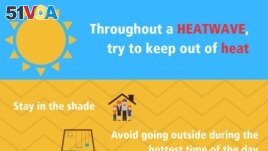05 July 2021
From VOA Learning English, this is the Health & Lifestyle report.
Hot weather kills hundreds of people every year. The World Health Organization estimates that from 1998 to 2017 more than 166,000 people died as a result of extreme heatwaves. That includes the more than 70,000 people who died during the 2003 heatwave in Europe.
Yet, heat-related deaths and sickness are preventable. There are steps you can take to stay safe during periods of very high temperatures.
Many things can affect your body's ability to cool itself during extremely hot weather.
For example, when the humidity is high, body sweat will not dry as quickly. This restricts the body's ability to release heat. So, pay attention to not only the temperature in your area but also the level of humidity.
Also, take note of nighttime temperatures. Experts say heat waves often become dangerous when the nighttime temperature does not drop much past the highest daytime temperature. Our bodies repair themselves at night when we sleep. So, hot nighttime temperatures put great pressure on the human body.
Some foods and drugs can also affect the body's temperature. Alcohol, caffeine, and sugar, for example, can weaken the body's system for cooling itself.
On its website, the Centers for Disease Control and Prevention, or CDC, explains that some people are at high risk of suffering from heat-related illnesses.
A person's age and weight play a part in surviving high temperatures. People over 65 years of age and under the age of two are especially at risk of becoming sick from heat.
Your general health is also important to consider. The CDC states that long-term diseases and conditions such as diabetes, heart disease and mental illness can put a person at greater risk.

WHO Heatwave safety precautions
On its website the CDC also explains different types of heat-related illness – what to look for and what to do.
They include heat rash, sunburn, heat cramps, heat exhaustion, and, the most serious, heat stroke.
These are the symptoms of heat exhaustion:
- heavy sweating
- cold, damp skin that looks lighter than usual
- fast, weak heartbeat
- feeling sick to your stomach, or nausea
- muscle pains, often called cramps
- tired and weak feeling
- dizziness
- headache
- passing out
If you have these symptoms, you must move to a cool place, loosen your clothing, put a cool wet cloth on your body or take a cool bath and drink water. Get medical attention if you begin vomiting, or if your sickness worsens or lasts for more than an hour.
The CDC calls heat stroke a medical emergency. Get medical help right away. These are the symptoms of heat stroke:
- high body temperature of 39.4 degrees Celsius or higher
- hot, red, dry, damp skin
- fast, strong heartbeat
- headache
- dizziness
- nausea
- confusion
- and passing out
Experts at the CDC say that "everyone should take these steps to prevent heat-related illnesses, injuries, and death" when the weather is very hot:
- Stay inside in air-conditioned spaces as much as possible. Contact your local health department or locate an air-conditioned shelter in your area, if possible.
- Drink a lot of water even if you do not feel thirsty.
- Wear loose, lightweight, light-colored clothing and use skin products that protect you from sunburn.
- Do not try to do too much outside. Plan your outdoor activities carefully.
- Get in cool water to lower your body temperature.
- Check on friends or neighbors, especially those at-risk. Have someone do the same for you.
- Never leave children or pets in cars.
- Check your local news for health and safety updates.
- Do not use heating elements, like indoor stoves and ovens, to cook food. This will make you and your house hotter.
And that's the Health & Lifestyle report. I'm Anna Matteo.
Anna Matteo used several websites to collect this information for VOA Learning English. The infographics are all courtesy of the World Health Organization. Caty Weaver was the editor.
______
Words in This Story
humidity – n. wetness in the air: the amount of wetness in the air
sweat – n. to produce a clear liquid from your skin when you are hot or nervous
vomit – v. to have the food, liquid, etc., that is in your stomach come out through your mouth because you are sick
pass out – v. to fall asleep or become unconscious
symptom – n. a noticeable change in the body or its functions that indicates the presence of a disease or other disorder
damp – adj. somewhat or slightly wet
dizziness – n. a condition in which you feel like you are turning around in circles and are going to fall even though you are standing still
air-conditioned – adj. a space that has a mechanical system used for cooling and drying the air in a building, room, etc.













